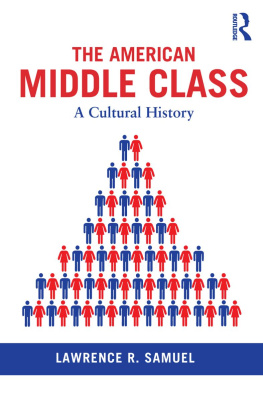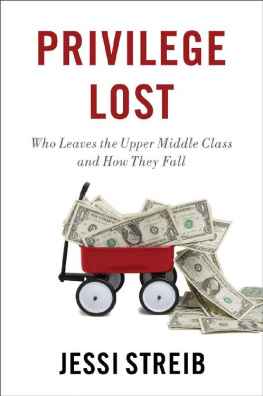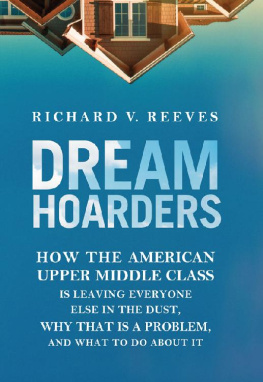Lamont - Money, morals, and manners: the culture of the French and American upper-middle class
Here you can read online Lamont - Money, morals, and manners: the culture of the French and American upper-middle class full text of the book (entire story) in english for free. Download pdf and epub, get meaning, cover and reviews about this ebook. City: Chicago;Ill;Frankreich;USA, year: 2008, publisher: University of Chicago Press, genre: Politics. Description of the work, (preface) as well as reviews are available. Best literature library LitArk.com created for fans of good reading and offers a wide selection of genres:
Romance novel
Science fiction
Adventure
Detective
Science
History
Home and family
Prose
Art
Politics
Computer
Non-fiction
Religion
Business
Children
Humor
Choose a favorite category and find really read worthwhile books. Enjoy immersion in the world of imagination, feel the emotions of the characters or learn something new for yourself, make an fascinating discovery.

Money, morals, and manners: the culture of the French and American upper-middle class: summary, description and annotation
We offer to read an annotation, description, summary or preface (depends on what the author of the book "Money, morals, and manners: the culture of the French and American upper-middle class" wrote himself). If you haven't found the necessary information about the book — write in the comments, we will try to find it.
Lamont: author's other books
Who wrote Money, morals, and manners: the culture of the French and American upper-middle class? Find out the surname, the name of the author of the book and a list of all author's works by series.
Money, morals, and manners: the culture of the French and American upper-middle class — read online for free the complete book (whole text) full work
Below is the text of the book, divided by pages. System saving the place of the last page read, allows you to conveniently read the book "Money, morals, and manners: the culture of the French and American upper-middle class" online for free, without having to search again every time where you left off. Put a bookmark, and you can go to the page where you finished reading at any time.
Font size:
Interval:
Bookmark:
MORALITY AND SOCIETY
A series edited by Alan Wolfe
The University of Chicago Press, Chicago 60637
The University of Chicago Press, Ltd., London
1992 by The University of Chicago
All rights reserved. Published 1992
Paperback edition 1994
Printed in the United States of America
19 18 17 16 15 14 13 12 11 10 09 5 6 7 8 9 10
ISBN-13: 978-0-226-46815-0 (cloth)
ISBN-13: 978-0-226-46817-4 (paper)
ISBN-10: 0-226-46815-1 (cloth)
ISBN-10: 0-226-46817-8 (paper)
ISBN-13: 978-0-226-92259-1 (e-book)
Library of Congress Cataloging-in-Publication Data
Lamont, Michle, 1957Money, morals, and manners : the culture of the French and American upper-middle class / Michle Lamont p. cm. (Morality and society) Includes bibliographical references and index.
1. Middle classesUnited StatesMoral and ethical aspectsCross-cultural studies. 2. Middle classesFranceMoral and ethical aspectsCross-cultural studies. 3. Social valuesUnited StatesCross-cultural studies. 4. Social valuesFranceCross-cultural studies. I. Title. II. Series
HT690.U6L36 1992
305.550944dc20 | 92-7270 |
CIP |
 The paper used in this publication meets the minimum requirements of the American National Standard for Information SciencesPermanence of Paper for
The paper used in this publication meets the minimum requirements of the American National Standard for Information SciencesPermanence of Paper for
Printed Library Materials, ANSI Z39.48-1992.
Ce livre est ddi mon pre et ma mre,
Jacques et Ninon.
Prologue
SKETCHING THE LANDSCAPE: SOME ILLUSTRATIVE VIGNETTES
Chapter One
THE QUESTIONS AND THE STAGE
Chapter Two
THE IMPORTANCE OF BEING HONEST KEYS TO MORAL BOUNDARIES
Chapter Three
THE WORLD OF SUCCESS, MONEY, AND POWER: KEYS TO SOCIOECONOMIC BOUNDARIES
Chapter Four
MOST OF MY FRIENDS ARE REFINED: KEYS TO CULTURAL BOUNDARIES
Chapter Five
EXPLAINING NATIONAL DIFFERENCES
Chapter Six
THE NATURE OF INTERNAL CLASS BOUNDARIES
Upper-Middle-Class Members
Chapter Seven
IMPLICATIONS, CONTRIBUTIONS, AND UNANSWERED QUESTIONS
Appendix I
SURVEYING THE FRENCH AND AMERICAN UPPER-MIDDLE CLASSES
Appendix II
THE RESEARCH SITES
Appendix III
RESEARCH PROCEDURES
Appendix IV
RANKING OF RESPONDENTS ON THE CULTURAL, MORAL, AND SOCIOECONOMIC DIMENSIONS
TABLE 1
Occupation and Age of Male Interviewees by Sites and Category of Occupation
TABLE 2
Occupation and Age of Male Interviewees by Sites and Detailed Category of Occupation
TABLE A.1
Highest Academic Degree of Respondents and Types of University Attended by Sites
TABLE A.2
Annual Household Income of Respondents by Sites in 1989 Dollars
TABLE A.3
Ranking of Interviewees on the Cultural, Moral, and Socioeconomic Dimensions
TABLE A.4
Average Score and Percentage of Participants Who Score 4 or 5 on the Moral, Socioeconomic, and Cultural Scales by Occupational Groups and Sites
TABLE A.5
Average Score and Percentage of Participants Who Score 4 or 5 on the Moral, Socioeconomic, and Cultural Scales by Detailed Occupational Groups and Sites
MAP A.1
The New York Suburbs
MAP A.2
The Paris Suburbs
MAP A.3
France
During the years that I was working on this project, I accumulated an impressive stock of debt. My first thanks go to the almost two hundred men and women who spent two or more hours of their busy lives sharing with me their intimate feelings and thoughts. I hope they will find that their trust has not been violated and that they will recognize their voices behind the sociological massaging of the data.
My second thanks go to the institutions that provided financial support for the research that led to this book: the Lilly Endowment, for providing the main funding for the project; the National Science Foundation and the American Sociological Association, for a small grant that in 1987 supported the pilot study that led to the book; and at Princeton University, the University Committee on Research in the Humanities and Social Sciences, the William Hallum Tuck 12 Memorial Fund, the Council on Regional Studies, the Center of International Studies (Woodrow Wilson School), and the Department of Sociology. Special thanks to Ezra Suleiman, director of the Council on Regional Studies, Henry Bienen, director of the Center of International Studies, and Marvin Bressler, until recently chair of the Department of Sociology, for providing crucial resources that made ends meet.
Third, I wish to express my appreciation to Seymour Martin Lipset who has helped me in so many ways since I first arrived at Stanford University in 1983 from Paris, having just completed a doctoral dissertation on the growth of the social sciences and the decline of the humanities. His total involvement with and love for his work, as well as his support, were crucial to me while I was learning to write in English and was familiarizing myself with American sociology and American society through many faux pas. His writings in comparative sociology have had a distinct influence on my own intellectual agenda.
A team of very competent research assistants who participated in the sampling, phone interviewing, and transcribing phases of the project have a large share of responsibility for its realization. They include, for Indianapolis, Richard Adams and Pamela Braboy (Indiana University, Bloomington); for the New York suburbs, Libby Schweber, Kei Sochi, Yvonne Veugelers (Princeton University) and Judith Darvas (New York University), for the Paris suburbs, Guy Campion, Julie Cheatley, Etienne Lisotte, and Mario Vachon (Universit de Paris 5); and for Clermont-Ferrand, Aline Chiofolo (Universit de Clermont 1). In Princeton, Laila Ahsan, Raymonde Arsenault, Vandala Gupta, Lisa Roche, Libby Schweber and Laurence Thbault transcribed the interviews while Raphael Allen, Terry Boychuk, Timothy Dowd, Gil McKennan, Rhonda Patterson, and Frank Small helped with computer work or assisted me in the final phases of the project.
The organization of the project was very complex and could only be accomplished with local assistance both in France and in the United States. Those who helped me solve specific organizational problems at various phases in the research include Pierre Ansart (Universit de Paris 7), Alain Boyer (Centre National de Recherche Scientifique, Paris), Donna Eder (Indiana University), Daniel Gaxie (Universit de Paris 1Sorbonne), Judith Balfe (CUNY Graduate Center), and James Jasper (New York University). While I was on the road, several of my native friends invited me to share their homes for a few days or a few weeks: Warren and Julie McKellar (Indianapolis); Randy and Susan Hodson (Bloomington, Indiana); Mrs. Lee Huggins (Summit, New Jersey); Vera and Aristide Zolberg (Manhattan); Genevive Lde (Paris); and the Pitelet family (Clermont-Ferrand). The Institute for Social Research, Indiana University, made its phone facilities available to the project. Finally, Corinne Srange, the agent des relations publiques of the Ville de Clermont-Ferrand, and Roger-Paul Cardot, directeur rgional, Comit dAccueil, Direction Gnrale Auvergne-Limousin, also were particularly helpful.
While working on the manuscript, I was given the valuable opportunity to present my arguments to various audiences. Each contributed to the final product by making me push my ideas further. These audiences include the sociology departments of Cornell University, the New School for Social Research, the University of Pennsylvania, and the City University of New York Graduate Center; the Culture Workshop of the University of Chicago; the Center for the Study for Social Transformation, University of Michigan; the Institute for the Humanities, University of California, Irvine; the Communication Studies consortium, Concordia University, Universit de Montral, and Universit du Qubec Montral; the Max Weber Seminar, Universit de Paris 1Sorbonne; the audience at various professional meetings and conferences. I want to thank the people who were kind enough to extend these invitations: Mitchell Abolafia, Steven Brint, William Buxton, Michel Dobry, Daniel Gaxie, Wendy Griswold, David Halle, Elizabeth Long, Ewa Morawska, Victor Nee, Andrea Press, Paul Rabinow, Barry Schwartz, Alan Wolfe, and Vera Zolberg.
Next pageFont size:
Interval:
Bookmark:
Similar books «Money, morals, and manners: the culture of the French and American upper-middle class»
Look at similar books to Money, morals, and manners: the culture of the French and American upper-middle class. We have selected literature similar in name and meaning in the hope of providing readers with more options to find new, interesting, not yet read works.
Discussion, reviews of the book Money, morals, and manners: the culture of the French and American upper-middle class and just readers' own opinions. Leave your comments, write what you think about the work, its meaning or the main characters. Specify what exactly you liked and what you didn't like, and why you think so.







